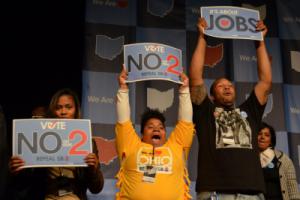Labor Takes Final Stand as Wisconsin Prepares Way for Anti-Union Law
Al Jazeera
 “[Right-to-work] is going to bring everybody down,” said Russ Krings, the directing business representative for the Milwaukee union International Association of Machinists District 10, during a press conference with other labor leaders on Monday. “It’s going to affect not only the union families and nonunion families. It’s going to affect all the businesses that we go and spend our money at. This is going to bring the economy down."
“[Right-to-work] is going to bring everybody down,” said Russ Krings, the directing business representative for the Milwaukee union International Association of Machinists District 10, during a press conference with other labor leaders on Monday. “It’s going to affect not only the union families and nonunion families. It’s going to affect all the businesses that we go and spend our money at. This is going to bring the economy down."








Spread the word